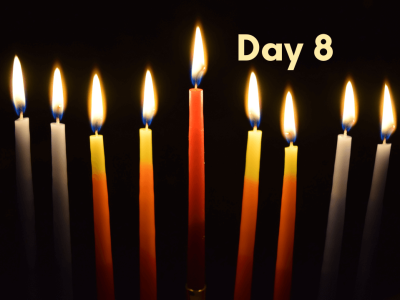L.E.A.D. – A Talking Donkey
L.E.A.D. – A Talking Donkey
The Doctrine of Balaam
The story of Balaam in the Torah is, in many ways, a shocking digression from what had come before (Numbers 22-24). It is the first time that the action of the story comes away from the nation of Israel itself to reveal an event that, at the time, the people of Israel were utterly unaware of, but one that would have a significant impact on them. Even more surprising is that the person we follow in this section of the Scriptures is a magician and diviner following up on a request to
curse God’s people by a vindictive and fearful Moabite king, Balak. It is a sudden but essential shift in perspective that can teach us about the nature of curses and blessings in the lives of God’s people, illustrating things that we must be vigilant against when looking to protect ourselves from the enemy’s schemes to pull us out from the protective covering of our Father in Heaven.
When we are first introduced to Balaam, he does appear to be a servant of YHWH, communicating with God directly to seek advice as to whether or not he should go with the men of Moab and Midian. They had brought both the request and ‘diviner’s fee’ to come and curse Israel. After receiving word from Adonai that he must neither go with the men nor curse Israel, Balaam turns down the money and refuses to join the messengers, passing on the message that God Himself had denied him permission to go. Even after a frustrated Balak sends more distinguished emissaries with promises of an even greater reward, Balaam informs them that no amount of riches would ever allow him to go against the command of YHWH, even referring to Him as ‘YHWH my God’ (Number 22:18). So far, these responses seem to be the actions of someone who understands the power of El Shaddai and respects His will, but the events that follow demonstrate something else.
 At this second visit, Balaam once again insists that he must consult the Lord, but his response to God’s command this time is different. God tells him that he can join the men only if they call him to join them, something that is not, evident in all translations but is a crucial distinction to make to understand why Balaam incurs God’s wrath by going with the men (Numbers 22:20). Balaam, without waiting for the call that would have permitted him, saddles his donkey in the morning and sets off with the emissaries, which is much clearer in the original Hebrew. Rather than the text saying ‘ki halach’ (‘he went’), it says ‘ki holech hu,’ which means something like ‘he went off his head,’ i.e., he went of his own volition without being called. It had been easy to turn down the men when they came simply with compliments and a basic fee, but when they came with offers of great honor and riches, it became a different story; it became easier to turn away from God’s Word. They had appealed to Balaam’s pride and greed, and these things had overcome his sense of righteousness. The fact that he was a prophet-for-hire alone should be enough to reveal that, although, in communication with YHWH, he was certainly NOT one of His true prophets.
At this second visit, Balaam once again insists that he must consult the Lord, but his response to God’s command this time is different. God tells him that he can join the men only if they call him to join them, something that is not, evident in all translations but is a crucial distinction to make to understand why Balaam incurs God’s wrath by going with the men (Numbers 22:20). Balaam, without waiting for the call that would have permitted him, saddles his donkey in the morning and sets off with the emissaries, which is much clearer in the original Hebrew. Rather than the text saying ‘ki halach’ (‘he went’), it says ‘ki holech hu,’ which means something like ‘he went off his head,’ i.e., he went of his own volition without being called. It had been easy to turn down the men when they came simply with compliments and a basic fee, but when they came with offers of great honor and riches, it became a different story; it became easier to turn away from God’s Word. They had appealed to Balaam’s pride and greed, and these things had overcome his sense of righteousness. The fact that he was a prophet-for-hire alone should be enough to reveal that, although, in communication with YHWH, he was certainly NOT one of His true prophets.
Balak declares in his first request that Balaam is someone whose curses and blessings did succeed, suggesting that Balaam was, in fact, a cunning and devious master of witchcraft. Balaam referring to YHWH as ‘my God’ could indicate that his practices worked through manipulation of spiritual beings through feigned respect, which could then be used for whatever end he saw fit. This is further suggested by the fact that after having been told ‘no’ in response to the first request, he
still ‘respectfully’ petitions God after the second request and then acts against the reaction he receives regardless, going with the men even though they had not called him to do so. It would seem from this that Balaam believed YHWH to be as easily manipulated as the other entities he used in his practices. Still, as we know, this could only have led to his downfall (Joshua 13:22). We must be careful with things like this ourselves. How often have you found yourself repeatedly
asking God for something He has already said no to? God is unchanging (Malachi 3:6), so when He says no, it means no, and no amount of repeatedly asking the question in the hope of receiving a different answer will change that fact. Like Balaam, pushing against God’s response to our petitions can only lead to problems.
The first indication for Balaam that he had taken the wrong decision should have been the actions of his donkey (Numbers 22:22-23). Still, like so many of us who ignore the voice and hand of God trying to stop us from going down the wrong path, he incorrectly considered it as simply indicative of his animal’s sudden and inexplicable stubbornness. It is too easy for us to just angrily beat and curse the things that work against us for our good, those things that try to take us off a path we are walking that will only lead to sin and death, rather than to stop and consider whether or not God’s hand is in those obstructions. It is also probable that Balaam was still in the company of the king’s emissaries, so there is the distinct possibility that his frustration was amplified by a feeling of embarrassment that such a ‘great prophet’ could not even control his donkey! It is in states of mind such as this that there is the heightened risk of ignoring the message from God and acting through the emotions we are feeling at the time, which holds the other stake of us just reinforcing our determination to do what we wanted to do in the first place.
As a practitioner of witchcraft, Balaam had experience manipulating the spiritual realm and the spiritual beings that the pagan nations worshipped as gods using his knowledge and skills. Still, this time he was dealing with the Most-high God, El Elyon, the Creator of the universe and the Lord of all things. YHWH needed Balaam to know who He was and that His dominion was over all creation, showing that no amount of manipulation would ever work against Him. By opening the donkey’s eyes first, Adonai showed that even if a man follows his own will against God’s instruction, God has the power over creation to ensure He will be done, no matter what. Allowing Balaam to see the Angel also made sure that he would realize that his control over spiritual beings was more limited than he may have considered. The unveiling of the Angel standing ready with a sword revealed to Balaam that God could have struck him down at any point. Still, by using his faithful donkey to give him those three opportunities to turn aside from that path to sin and ultimately death, God mercifully gave him a chance to make the right decision and save his own life. YHWH was not only demonstrating His power but His mercy as One who holds all life in His hands.
If we are not continually seeking the direction of the Holy Spirit for the paths we walk, then we will find that God will often use the circumstances of our journey to draw our attention back to Him and His instructions. By allowing negative things to happen to us, He is not hurting us but protecting us from a greater danger. Our Father is allowing us to stop and question whether or not we are aligned with His will. As Balaam discovered in that moment of strife along the road, God does not just speak to us through prayer but through the physical world around us. If we are not taking the time and space to perceive what is happening around us through a spiritual lens, we may miss the ever-present messages that point us away from our imperfect desires and towards the will of God. God is always speaking, but whether we are always listening well enough to be able to realize that and so correctly interpret those messages for our lives is down to the willingness to step away from what we want and look to God’s will, which will allow us better to perceive His hand and voice in all things.
When Balaam finally reaches his destination and joins Balak, he proceeds with the work he was commissioned for, three times and from three different vantage points of Israel’s wilderness camp, building an altar and lifting offerings to gain the attention of God. Each time Balaam receives a prophetic message from YHWH to pass onto Balak, declaring that Israel cannot be cursed in such a manner because God had blessed them. Furthermore, at the end of the third prophecy, Balaam even quotes the covenant promise given to Abraham in Genesis 12:3, that all those who bless God’s people would be blessed, and those who curse them would be condemned. For the first time, people outside of Israel had heard those promises given to Abraham and his descendants, and not since the plagues of Egypt had such a devastating picture of God’s protection and blessing of Israel been given to those who would choose to set themselves up as enemies of YHWH’s people. Balaam was hired to curse and destroy Israel, revealing that no weapon brought against God’s people, whether physical or spiritual, could ever prevail while God held them in His hand. Like Balaam’s incident on the road, Balak had been shown the power of God and the true blessing of His protection: as long as Israel remained in covenant with God, nothing could harm them. Balak’s determination to destroy Israel was not quenched by God’s messages, however, nor was Balaam now a reformed man, certainly not with the honor and riches of the Moabites and Midianites that could be his if he succeeded in his mission to curse Israel. Together they conceive of a plan that would follow in bringing death and destruction to Israel but through the choices of the people themselves. Balaam had demonstrated some understanding of God’s laws through his knowledge of the sacrifices and must have known of the commandments against joining with the daughters of Moab. As such, he sent out the most beautiful of Moabite women, who enticed the men into both fornication and idolatrous worship of Baal-Peor, one of the pagan gods (Numbers 31:16). Through the disobedience and breaking of the terms covenant, those men took themselves out from the covering and protection of God and so brought destruction to themselves. A plague spread through the nation, killing 24,000 Israelite men, only ceasing following the zealous act of Pinchas (known as Phinehas in English translations), grandson of Aaron. He executed an Israelite leader in the profane act of fornication with a Midianite princess. Nobody can curse God’s people while they are under the protection and blessing of God, but they can most certainly condemn themselves by stepping out of the covenant.
The doctrine of Balaam can still affect the lives of God’s people today. Still, it most importantly must be acknowledged as being down to the choices that are made as individuals 2 Peter 2:15, Jude 1:11). Balaam’s doctrine teaches that what we want in life is of supreme importance and that we can use other people or even God to get them, the sacrifices simply being a means of justifying the choice of doing what we want. Through Balaam’s wicked but successful scheme, he also encouraged the men of Israel to see the sexual immorality that is contrary to God’s Law as being compatible with the conditions of the covenant in the Torah, but which led to spiritual adultery, idolatry (Revelation 2:14). It is this doctrine that encourages people to think that they can follow the world and their desires, and still serve God (Romans 8:5-8, James 4:4, 1 John 2:15). That compromise is acceptable as long as it benefits them.
Do not succumb to a doctrine and attitude that compromises God’s ways for your own sake (Luke 14:26-27). Remember that as long as you are in the covenant of God and following His ways as exemplified by Messiah Yeshua, you are under the covering of God. No curse can ever harm you (Proverbs 26:2), but it is through putting God, His commandments, and His will as secondary to the desires that can take us out from His covering. The doctrine of Balaam is a great temptation to many of those who would call themselves a part of Israel. Still, it comes down to a simple choice: obedience or disobedience, blessing or curse, and ultimately, life or death.
Blessings,
Jim Staley












